- Home
- Jennifer Ashley
The Pirate Next Door Page 7
The Pirate Next Door Read online
Page 7
He had agreed to meet St. Clair, although he had not much to report. He’d spread a network over the river towns that marched toward the Channel: Greenwich, Blackwall, Gravesend. He had learned some interesting gossip; for instance, he knew that a dock master in Blackwall would take rum, tobacco, slaves, and strangely, pins, for bribes, and that the mistress of the Lord Chancellor was pregnant, probably not with his child. But nothing about the French king. If he were being transported down the Thames, Grayson had not yet found any evidence of it.
But the monarch also had not turned up in France.
St. Clair had spies there as well, and there had been no ransom demands for the corpulent king, nor any gleeful proclamations from the republic that another Bourbon king had been beheaded. Grayson understood from St. Clair that the English were more or less allowing Louis of France and his supporters to remain here in reserve for the day that Napoleon was toppled. But Napoleon had dug himself in pretty deep, and Grayson did not anticipate that date anytime soon.
It was strange to view these political battles from the other side of the water. The war with Napoleon had made the English naval vessels in the Caribbean jittery, not to mention a bloody nuisance. They would fire on and board almost any ship they came across, and press-ganging had reached an astronomical level. He and Jacobs had twice been accosted in taverns by English sailors looking to fill more ranks. He and Jacobs had explained, firmly, that they were busy.
American privateers strolling up and down the waters pounced on ships left alone by the British navy, making things even more dicey. Then there were the pirates. And then there was Ardmore.
All in all, striding through glittering Mayfair searching for a missing king was a walk in the park compared to slipping through all those blockades and dodging the madman, James Ardmore. And, in the end, Grayson had not dodged fast enough. But escaping Ardmore would have entailed abandoning Maggie, and that Grayson knew he would never be able to do.
He remembered with hot clarity the hard planking of Ardmore’s deck beneath his knees, the rope burning his neck, the cold sword at his throat. His wrists had been raw with his bonds, his torso bruised where Ardmore and his lieutenants had beaten him. “Why should I not kill you, Finley?” Ardmore had sneered. “Give me a reason not to hang you from the highest yardarm.” Grayson remembered his own voice, cracked and desperate, answering, “Because my daughter would miss me.”
Jacobs smoothed the black coat over Grayson’s broad shoulders, jerking him back to the present.
“Did they get off to the theatre?” he asked.
“They did, Captain. In Mrs. Alastair’s carriage. Fine team.”
Grayson narrowed his eyes. “With the guard?”
“Priestly is on it, sir.”
“Good.”
He imagined Mrs. Alastair’s pretty eyes going all furious when she discovered that he’d sent along one of his men to keep watch over her, but damned if he was going to let her wander about with his daughter when Burchard was loose.
He had tracked the supposedly dead pirate to lodgings in St. James’s, a house of rooms for respectable and slightly wealthy gentlemen. He’d assigned another of his officers the duty of wandering about coffee houses in the area and keeping a surreptitious eye on the lodgings. Grayson had not actually seen Burchard himself, but every instinct told him it was the same man, despite the incongruities.
A rumble of carriage wheels sounded in the street outside, and then the sound of someone thumping on his front door. Grayson moved to the front room and peered out the window. It was not the carriage he had hired, or Ian O’Malley returning. It was a hired hack, however, and the fellow who’d thumped the door now turned back and handed a woman out of the carriage.
“Damn, I forgot about the governess.”
“Want me to take care of her, sir?” Jacobs asked, a bland expression on his face. What he meant was, he knew what to do with servants of the governess’ class while Grayson only knew how to command pirates. Grayson scowled. “I will talk to her. She is here to teach my daughter.”
Oliver had already lumbered down the front stairs to open the door. Grayson strode after him, and Jacobs, with a slight smirk on his face, brought up the rear.
Low, feminine tones met his ear as he stepped off the last stair. Oliver led a woman into the dimly lit hall and went past her to fetch her cases. She began to remove her gloves, and looked up. “Your lordship? I am Mrs. Fairchild. Mrs. Alastair, sent me.”
Grayson stopped, his stride arrested. Good lord, she had been Alexandra’s governess? Alexandra had explained in her coldly polite letter that the woman had taught her and would be excellent for Maggie. Grayson had expected Mrs. Fairchild to be gray, stout, and grandmotherly. What he saw was a woman of about his own age, black-haired with a sculpted face and eyes as dark as midnight. Red lips curved into a polite smile, and sable lashes lowered under his scrutiny.
The rest of her could have made even a man of the most monkish habits go hard in a trice. Her gown was a dull gray, governesslike, but it outlined a body of lush curves, and draped limbs that were long and shapely.
His daughter’s governess. The woman who had made Alexandra Alastair what she was today. This could prove interesting.
Grayson pasted on a smile and held out his hand. “Mrs. Fairchild.”
She took it, exuding politeness. She looked past him and suddenly went white to the lips.
Grayson studied her, puzzled. The woman had stopped breathing. She was gazing at something behind him, her eyes wide with shock. He disengaged his hand from hers and turned.
She was looking at Jacobs. He stood three steps up the stairs, and he too had frozen in place, his hand locked around the banister. His face had gone paper white.
Grayson folded his arms and leaned against the newel post. Neither of them moved, not even when Oliver came trundling past with the bags and began climbing the stairs.
Grayson said, “Do you two know each other?”
Jacobs’s head snapped up. His face flooded with color and his Adam’s apple bobbed with a hard swallow. “Uh, no, sir. Of course not.” He looked away.
A blatant lie. Mrs. Fairchild had obviously recognized Jacobs as well. This was becoming more interesting by the minute.
Grayson unfolded himself. “Maggie is at the theatre with Mrs. Alastair tonight, Mrs. Fairchild. You can spend the time unpacking and getting settled. I am going out. If you want tea or anything, ring Oliver.”
“Of course, my lord.” Her voice was strangled and breathy.
“Good. I will speak to you tomorrow. Good evening, Mrs. Fairchild.”
A spark of misery and fear hovered deep in her dark, lovely eyes. Grayson longed to know what this was all about, but he had an appointment with St. Clair and the fashionable dandies of Mayfair. He’d have to pry into the private lives of his lieutenant and his daughter’s governess later. He snatched up his hat and went out.
A light comedy was playing when Alexandra arrived with Maggie in tow, all about two sisters, one good, one bad, and their bewildered and countrified parents. The good sister ultimately landed the noble aristocrat’s love, plus his hand in marriage, while the bad sister was disgraced. She wept and begged pardon of her stricken parents at the end, and the family was reconciled. Maggie watched this all with great interest.
Of course, much of the play was drowned out by the audience who gossiped, shouted to each other, or called out to the players on stage. A group of young men evidently preferred the wicked sister and kept suggesting that she seduce the noble aristocrat and run away with him. That and to “show us your fine ankles, Nellie.”
Lord and Lady Featherstone had joined them in the box, which was comfortably settled with armchairs and a low table on which to place reticules, fans, and cups of tea. Lord Featherstone sipped tea and watched the play with furrowed brows. From time to time, Alexandra caught him giving Lady Featherstone an affectionate glance, and once, under cover of dim lighting, holding her hand. It gave Alexandra a lonely f
eeling.
After the first offering, the stage lit up again and a few acrobats danced on and commenced tumbling. Maggie turned to Alexandra, her eyes glowing. “The missionaries said all theatre was wicked. But it does not seem wicked.”
Lord Featherstone rolled his eyes. “Wesleyans.”
Maggie rested her chin on her hand. “But then, I am wicked, so maybe I do not notice.”
Alexandra’s earlier anger resurfaced. “Maggie, you are not wicked.”
The Featherstones exchanged a glance. “Indeed not,” Lord Featherstone said.
Maggie did not argue. She went on watching the dancing. She had Alexandra’s lorgnette in her hand and raised it to her eyes to gaze about the theatre.
Lord Featherstone left the box to pay a visit to some acquaintance, and when he returned, he had a gentleman with him. Alexandra’s heart turned over. He’d brought back Mr. Burchard, the one the viscount had so firmly crossed off her list. She had not told Lady Featherstone about this oddity, not knowing what to make of it herself.
But this man could not be the horrible villain Grayson claimed he was. Grayson must be talking about a different Zechariah Burchard. This Mr. Burchard was nearing forty, slightly gray at the temples, lean, and tall, though nowhere near as tall as Grayson. He had dark eyes that observed his surroundings quietly, and fine manners. Lady Featherstone had found nothing objectionable about him, though she was waiting on some inquiries she had made about his cousins who apparently lived in Yorkshire.
He bowed to Alexandra and Lady Featherstone, gave Maggie a curious glance, and accepted a chair. Lord Featherstone introduced Maggie as Miss Finley, Viscount Stoke’s daughter.
Did Mr. Burchard start at the name, or did Alexandra imagine it?
Conversation began. Mr. Burchard was deferential to Lady Featherstone and attentive to Alexandra without being flirtatious. Maggie had returned her attention to the rest of theatre, and Mr. Burchard did not seem overly interested in her.
Mr. Burchard’s unlined face bore no evil taint, and his eyes remained neutral. Too neutral perhaps? Alexandra shook herself. Imagination. There must be more than one Zechariah Burchard in the world.
Lord Featherstone did not say much, probably because Lady Featherstone had gone into full interview mode. She had pried from Mr. Burchard that he had no brothers or sisters, and that his father had left him a house near Scarborough that he planned to open later that year, and that he would be sending invitations for the shooting season.
Lady Featherstone gave Alexandra a look that said she was passing the token to her.
Alexandra touched her tongue to her upper lip and drew on her courage. “Uh—Mr. Burchard. Have you ever been to sea?”
She did not imagine his start that time. His backside left the seat and he bumped back down. But then, it had been a most unusual question. Lady Featherstone gave Alexandra an odd stare.
“To sea?” Burchard’s mouth opened and closed a few times.
Lord Featherstone stepped into the awkward gap. “I am often at sea,” he said, “when seeing the fripperies that are supposed to be fashion nowadays.”
Lady Featherstone laughed appropriately, and Alexandra pretended to smile. Lady Featherstone shot her an annoyed look, but took her cue from her husband. The moment smoothed over.
Maggie leaned over the balcony. “Oh look,” she cried. “There is Mr. Henderson!”
Alexandra glanced quickly to where she pointed. Indeed, she saw the blond man in spectacles who had so impudently assaulted her the week before. Her heart thumped.
Lady Featherstone had not actually observed the gentleman’s rude kiss before Alexandra’s house, and Alexandra had not explained to her what she’d learned from Grayson about the incident. Lady Featherstone went on chatting, sensing nothing amiss.
But Mr. Burchard’s reaction was unmistakable. His face drained of color, then became a sickly green. He looked at Alexandra and the light in his eyes changed from neutral to alarmed to wary. He knew that she knew that she was sharing her box with a villainous pirate, one who was supposed to have died a horrible and fiery death several months before. Oh, dear heavens.
Chapter Nine
Vanessa Fairchild thought, If I stay in this room all night and do not come out until I can leave in the morning, I will be all right. She shivered and hugged herself. The air wafting through the open window held the warmth of summer, but she could not seem to rid herself of chill.
She knew the cold had nothing to do with the temperature out of doors. As soon as she’d seen Robert Jacobs on the stairs, the bottom had dropped out of her snug little world. If only Alexandra had mentioned that Robert lived in the viscount’s house, Vanessa would never, never have left Oxfordshire.
But why should Alexandra mention him? Vanessa was to be governess to Viscount Stoke’s child, and Mr. Jacobs had nothing to do with that. And Alexandra could not have known the incident between her former governess and Robert Jacobs five years before.
She sipped the cold tea at her side. The dark-skinned man, Mr. Oliver, had brought it for her hours ago, after he had left her here to unpack. Her cases, untouched, still stood in the corner by the old fashioned square-posted bed. To cover her confusion, she had asked Mr. Oliver about himself. The taciturn man had unbent enough to tell her that his mother had been a slave and his father a Spaniard on Santo Domingo. He had known the viscount for nineteen years. Mr. Jacobs had joined them five years ago.
Five years. Right after—What was he doing here? Was he the viscount’s secretary? That would make sense; he had taken honors at Oxford. But Mr. Oliver would answer no more questions and had left her to unpack. The tea had long since chilled, but Vanessa would not ring for more.
Someone tapped softly on the door. Her hands clenched, but she forced them to relax. Perhaps Mr. Oliver had decided to bring her more refreshment of his own accord.
“Yes?” she called softly.
The door opened and Robert Jacobs walked in.
She stumbled up from her chair. They stared at each other, unspeaking. Damn him, he had grown even more handsome than she remembered. His hair was as dark, his eyes as chocolate brown, his form as tall and broad. No, broader. He’d filled out, muscle and bone, into a hard-chested, well-framed, delicious picture of masculinity.
She drew a shaking breath. “In the morning, I will explain to the viscount that I cannot stay.”
He walked firmly into the room. “Was seeing me again that repulsive to you?”
She blinked. “Repulsive? You?” She wanted to lie and tell him that indeed she had been most annoyed to find him here. Instead, she blurted, “You are just as beautiful as you ever were.” When I was thirty and you were twenty. And again now that we are each five years older.
Red stained his cheeks. “As I recall, you could not fly fast enough from that carriage the last time I saw you. Must have been repulsive, a young man declaring himself, and you the respectable wife of an Oxford don.”
Her breath came in small, dry gasps. After all these years, he still could quell her with one glance of his dark eyes. After all this time, when things should be over and done between them, she still could not face him without trembling. “I was not—But I did not know what to say to you. It was so impossible.”
“It was possible until one of us spoke.”
She lifted her hands in a supplicating gesture. “No, it was impossible. There would have been disgrace for you, ruin for me.”
His lips were white. “And now?”
“Now? There is nothing, now. I must make my way in the world. I have chosen to become a governess, as I was before.”
“Your husband left you destitute?”
She twisted her lips into a wry smile. “He had nothing to leave. A tiny income, which does little more than buy my bread.”
“Whereas I am heir to a fortune.”
Vanessa’s heart constricted. She gazed at him hungrily. He had been the only man in her entire life—so ironic, that—who had ever made her feel complete, wh
ole, loved. “What are you saying I ought to have done?”
He regarded her in silence. Five years ago, they’d had no choices. She saw now that their choices were just as narrow. There was longing, wanting, and great regret, but no solutions.
“The viscount deserves to know the truth,” she said.
Robert finally bestirred himself. “I will tell him.”
“I will. I should not have come in the first place.”
His hands clenched at his sides. “No. Captain Finley is not the usual sort of employer. I will explain things to him.”
She hesitated, puzzled. “Captain Finley?”
“I mean Lord Stoke. He used to be Captain Finley.”
“I see.” She did not, but she did not pursue it. The viscount certainly did not look like any other lord she had encountered in her career as a governess or as a don’s wife. He looked as though he spent most of his life outdoors. He was much too rugged—that was a good word, rugged—for a fine Mayfair mansion.
Alexandra had not mentioned that he’d been a sea captain, or whatever kind of captain he had been. In her letter she’d referred to him as “the viscount,” and all mentions of him had been oblique at best. But he was unquestionably handsome and had a certain charm. Odd that Alexandra had deliberately not said much about him. Most unlike the girl. Hmm.
“I will speak to him,” Robert repeated.
He looked at her for a long time, a scrutinizing, assessing look that did not hint of the desire or hunger she felt within herself. But, of course, he was a virile young man, and to the young, five years was a lifetime.

 Grant
Grant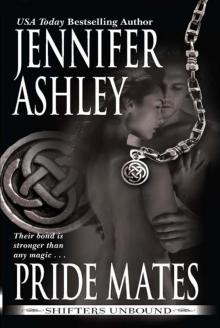 Pride Mates
Pride Mates The Duke's Perfect Wife
The Duke's Perfect Wife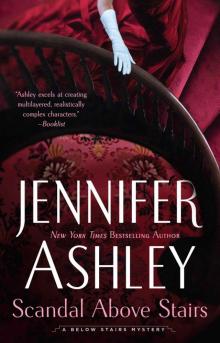 Scandal Above Stairs
Scandal Above Stairs White Tiger
White Tiger Midnight Wolf
Midnight Wolf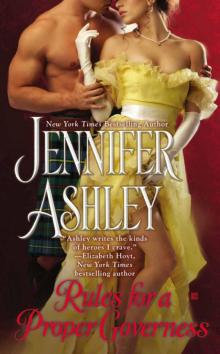 Rules for a Proper Governess
Rules for a Proper Governess Wild Wolf
Wild Wolf Bad Wolf
Bad Wolf Lion Eyes
Lion Eyes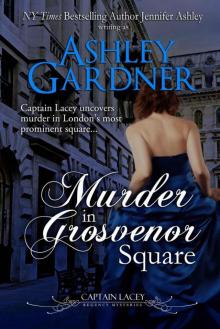 Murder in Grosvenor Square
Murder in Grosvenor Square The Untamed MacKenzie
The Untamed MacKenzie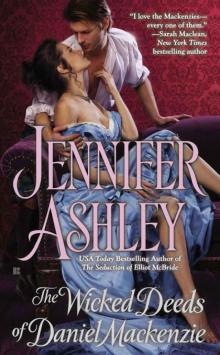 Wicked Deeds of Daniel Mackenzie
Wicked Deeds of Daniel Mackenzie Tiger Striped_Shifters Unbound
Tiger Striped_Shifters Unbound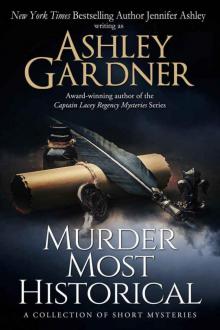 Murder Most Historical
Murder Most Historical Shifter Made
Shifter Made Mate Bond
Mate Bond Tiger Striped
Tiger Striped Bodyguard
Bodyguard Guardian's Mate
Guardian's Mate From Jennifer Ashley, With Love
From Jennifer Ashley, With Love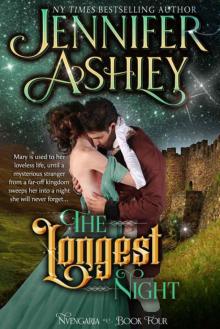 The Longest Night
The Longest Night The Stolen Mackenzie Bride
The Stolen Mackenzie Bride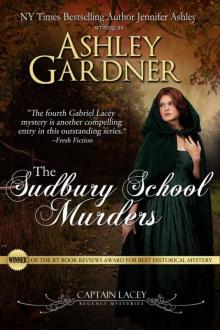 The Sudbury School Murders
The Sudbury School Murders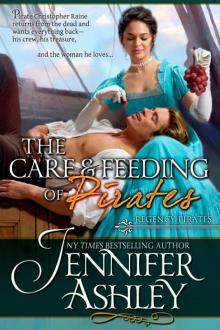 The Care & Feeding of Pirates
The Care & Feeding of Pirates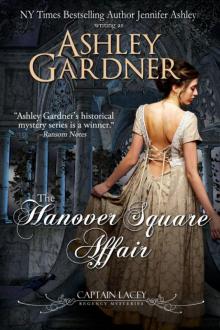 The Hanover Square Affair
The Hanover Square Affair Death Below Stairs
Death Below Stairs Wild Things
Wild Things Wild Cat
Wild Cat The Gentleman's Walking Stick
The Gentleman's Walking Stick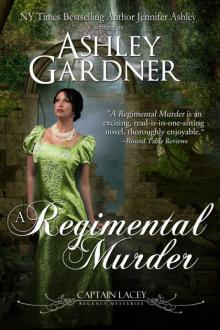 A Regimental Murder
A Regimental Murder Lone Wolf
Lone Wolf Forbidden Taste
Forbidden Taste Red Wolf
Red Wolf The Madness of Lord Ian Mackenzie
The Madness of Lord Ian Mackenzie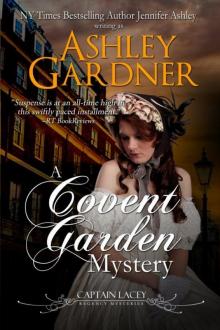 A Covent Garden Mystery
A Covent Garden Mystery The Pirate Next Door
The Pirate Next Door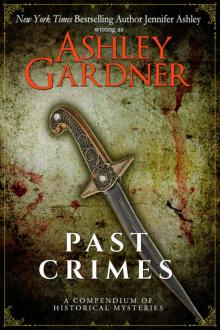 Past Crimes: A Compendium of Historical Mysteries
Past Crimes: A Compendium of Historical Mysteries Highlander Ever After
Highlander Ever After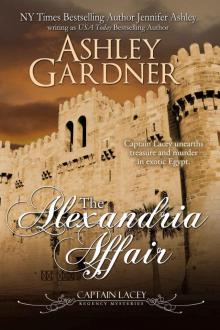 The Alexandria Affair
The Alexandria Affair A Shifter Christmas Carol
A Shifter Christmas Carol The Devilish Lord Will
The Devilish Lord Will Adam
Adam Kyle (Riding Hard Book 6)
Kyle (Riding Hard Book 6)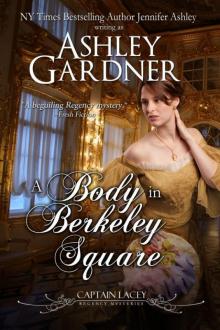 A Body in Berkeley Square
A Body in Berkeley Square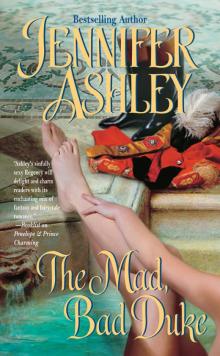 The Mad, Bad Duke
The Mad, Bad Duke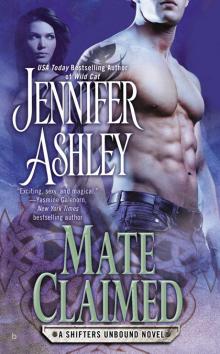 Mate Claimed
Mate Claimed A Mackenzie Clan Christmas
A Mackenzie Clan Christmas The Seduction of Elliot McBride
The Seduction of Elliot McBride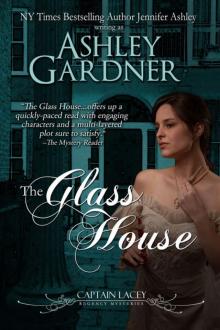 The Glass House
The Glass House Iron Master (Shifters Unbound Book 12)
Iron Master (Shifters Unbound Book 12) A Mackenzie Family Christmas: The Perfect Gift
A Mackenzie Family Christmas: The Perfect Gift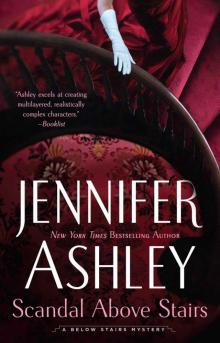 Scandal Above Stairs_A Below Stairs Mystery
Scandal Above Stairs_A Below Stairs Mystery Perfect Mate
Perfect Mate Murder in the East End
Murder in the East End Snowbound in Starlight Bend
Snowbound in Starlight Bend Hard Mated
Hard Mated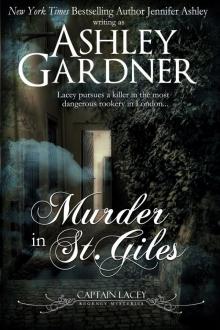 Murder in St. Giles
Murder in St. Giles Alec Mackenzie's Art of Seduction
Alec Mackenzie's Art of Seduction A MacKenzie Clan Gathering
A MacKenzie Clan Gathering Tyler
Tyler Lady Isabella's Scandalous Marriage
Lady Isabella's Scandalous Marriage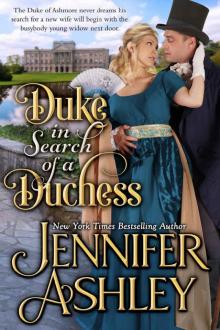 Duke in Search of a Duchess: Sweet Regency Romance
Duke in Search of a Duchess: Sweet Regency Romance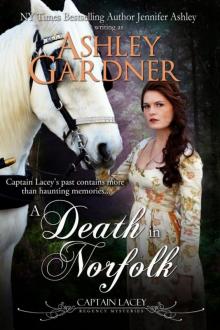 A Death in Norfolk
A Death in Norfolk Give Me One Night (McLaughlin Brothers Book 4)
Give Me One Night (McLaughlin Brothers Book 4) Iron Master
Iron Master The Many Sins of Lord Cameron
The Many Sins of Lord Cameron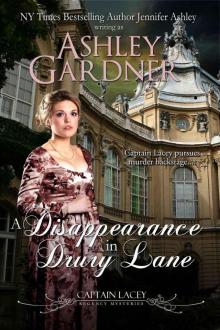 A Disappearance in Drury Lane
A Disappearance in Drury Lane Never Say Never (McLaughlin Brothers Book 3)
Never Say Never (McLaughlin Brothers Book 3) Death in Kew Gardens
Death in Kew Gardens Ross: Riding Hard, Book 5
Ross: Riding Hard, Book 5 Ray: Riding Hard
Ray: Riding Hard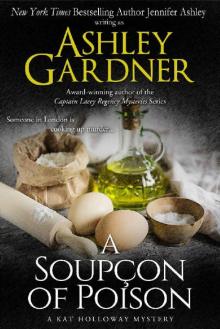 A Soupçon of Poison
A Soupçon of Poison Tiger Magic
Tiger Magic The Pirate Hunter's Lady
The Pirate Hunter's Lady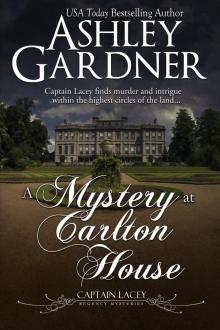 A Mystery at Carlton House
A Mystery at Carlton House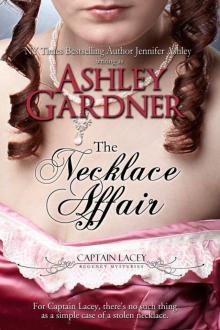 The Necklace Affair
The Necklace Affair Wolf Hunt
Wolf Hunt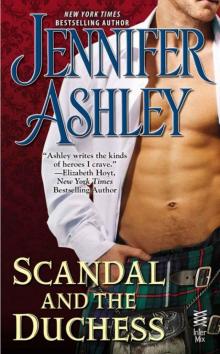 Scandal and the Duchess
Scandal and the Duchess Kyle
Kyle Why Don't You Stay? ... Forever (McLaughlin Brothers Book 2)
Why Don't You Stay? ... Forever (McLaughlin Brothers Book 2) Bear Attraction
Bear Attraction The Gathering
The Gathering A Mackenzie Yuletide
A Mackenzie Yuletide Wild Things (Shifters Unbound #7.75)
Wild Things (Shifters Unbound #7.75) The Redeeming
The Redeeming The Seduction of Elliot McBride hp-5
The Seduction of Elliot McBride hp-5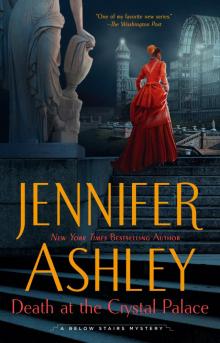 Death at the Crystal Palace
Death at the Crystal Palace Mackenzie Family Christmas: The Perfect Gift (highland pleasures)
Mackenzie Family Christmas: The Perfect Gift (highland pleasures) Forbidden Taste: A Vampire Romance (Immortals)
Forbidden Taste: A Vampire Romance (Immortals)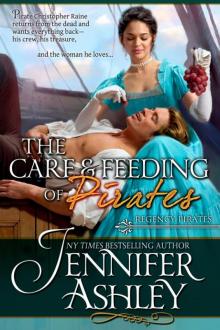 Care and Feeding of Pirates
Care and Feeding of Pirates Shifter Made (shifters unbound)
Shifter Made (shifters unbound) Dark and Dangerous: Six-in-One Hot Paranormal Romances
Dark and Dangerous: Six-in-One Hot Paranormal Romances The Duke’s Perfect Wife hp-4
The Duke’s Perfect Wife hp-4 The Seduction of Elliot McBride (Mackenzies Series)
The Seduction of Elliot McBride (Mackenzies Series)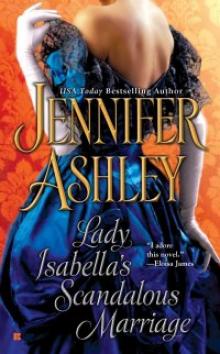 Lady Isabella's Scandalous Marriage hp-2
Lady Isabella's Scandalous Marriage hp-2 BodyGuard (Butterscotch Martini Shots Book 2)
BodyGuard (Butterscotch Martini Shots Book 2)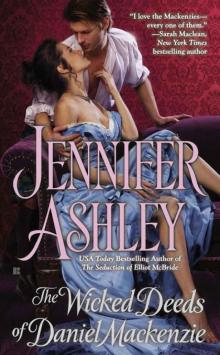 The Wicked Deeds of Daniel Mackenzie hp-6
The Wicked Deeds of Daniel Mackenzie hp-6 Tiger Magic su-5
Tiger Magic su-5 The Madness Of Lord Ian Mackenzie hp-1
The Madness Of Lord Ian Mackenzie hp-1 Alec Mackenzie's Art of Seduction: Mackenzies (Mackenzies Series Book 9)
Alec Mackenzie's Art of Seduction: Mackenzies (Mackenzies Series Book 9) Mackenzie Family Christmas: The Perfect Gift
Mackenzie Family Christmas: The Perfect Gift Bodyguard (Shifters Unbound #2.5)
Bodyguard (Shifters Unbound #2.5) Midnight Wolf (A Shifters Unbound Novel)
Midnight Wolf (A Shifters Unbound Novel) White Tiger (A Shifter's Unbound Novel)
White Tiger (A Shifter's Unbound Novel) Cowboys Last All Night
Cowboys Last All Night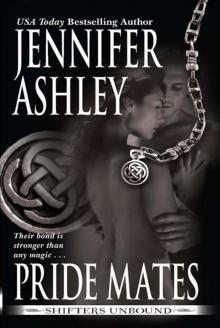 Pride Mates su-1
Pride Mates su-1 Hard Mated (shifters unbound )
Hard Mated (shifters unbound ) Bodyguard (shifters unbound )
Bodyguard (shifters unbound ) Snowbound in Starlight Bend: A Riding Hard Novella
Snowbound in Starlight Bend: A Riding Hard Novella The Untamed Mackenzie (highland pleasures)
The Untamed Mackenzie (highland pleasures) The Untamed Mackenzie (Mackenzies Series)
The Untamed Mackenzie (Mackenzies Series)![Highland Pleasures [6] The Wicked Deeds of Daniel Mackenzie Read online](http://i1.bookreadfree.com/i2/04/07/highland_pleasures_6_the_wicked_deeds_of_daniel_mackenzie_preview.jpg) Highland Pleasures [6] The Wicked Deeds of Daniel Mackenzie
Highland Pleasures [6] The Wicked Deeds of Daniel Mackenzie Lone Wolf (shifters unbound)
Lone Wolf (shifters unbound)![Shifters Unbound [5] Tiger Magic Read online](http://i1.bookreadfree.com/i2/04/11/shifters_unbound_5_tiger_magic_preview.jpg) Shifters Unbound [5] Tiger Magic
Shifters Unbound [5] Tiger Magic Tyler (Riding Hard Book 4)
Tyler (Riding Hard Book 4) Ross
Ross Bad Boys of the Night: Eight Sizzling Paranormal Romances: Paranormal Romance Boxed Set
Bad Boys of the Night: Eight Sizzling Paranormal Romances: Paranormal Romance Boxed Set From Jennifer Ashley, With Love: Three Paranormal Romances from Bestselling Series
From Jennifer Ashley, With Love: Three Paranormal Romances from Bestselling Series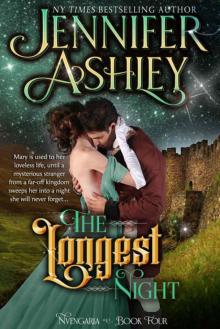 The Longest Night: Fantasy Romance (Nvengaria Book 4)
The Longest Night: Fantasy Romance (Nvengaria Book 4) The Many Sins of Lord Cameron hp-3
The Many Sins of Lord Cameron hp-3 Mate Claimed su-4
Mate Claimed su-4